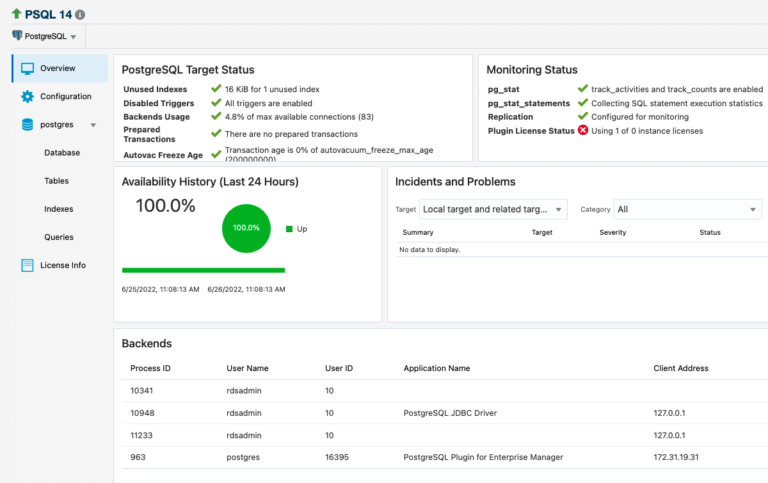The Integration Plumbers’ PostgreSQL Plug-in and The High Cost of Database Downtime
The Integration Plumbers’ PostgreSQL Plug-in and The High Cost of Database Downtime
In today’s data-driven world, businesses rely heavily on databases to store, retrieve, and manage business critical information. From customer data to transactional records, databases are the backbone of virtually every digital operation. This dependence, however, brings a significant risk in the form of database downtime.
Whether you’re running Oracle instances, PostgreSQL instances, or a mix of both, the cost of database downtime can be astronomical. Today, we are taking a look at the financial and operational impact of database downtime. We will understand why monitoring your Oracle and PostgreSQL databases using Oracle Enterprise Manager (OEM) along with the Integration Plumbers’ PostgreSQL plug-in is crucial for maintaining business continuity and performance.
The True Cost of Database Downtime
Database downtime doesn’t just mean that users can’t access information, it often leads to much more serious consequences:
Financial Losses
The most obvious impact of database downtime is the direct financial cost. According to recent studies in the industry, the average cost of database downtime can range from $5,000 to $15,000 per minute for larger organizations. This number can grow exponentially depending on the scale of your environments. E-commerce sites can lose sales every minute their database is down. Financial institutions may face transaction delays, leading to regulatory penalties and loss of customer trust. SaaS providers could lose subscribers who may decide to switch to competitors offering more reliable services.
Lost Productivity
When your database is down, your employees can’t access the data they need to do their jobs. This can cause a cascading effect throughout your entire organization. Customer support teams are unable to access customer records. Sales teams are unable to view inventory levels and customer data. IT operators are pulled from other projects to fight the fires. The list could go on and on. In industries like healthcare or finance, the impact is even more profound.
Customer Dissatisfaction and Reputational Damage
If customers can’t access your website, use your application, or rely on your services, they’ll quickly turn to your competitors. Even a few minutes of downtime can result in a loss of customer confidence that takes months, if not years, to recover from.
Reputation is everything. Downtime means frustrated customers, lost trust, and potentially negative reviews that can deter new users from ever engaging with your offerings.
Compliance and Legal Risks
For organizations in regulated industries like finance or healthcare, downtime could lead to non-compliance with industry regulations. If a company fails to meet SLAs or exposes customer data due to an outage, your company could face legal ramifications or hefty fines.
IT Staff Overhead
Your IT team’s time is valuable. Database downtime often results in emergency efforts to bring systems back online, which requires substantial manpower. Rather than proactively managing systems or innovating, your IT team could be scrambling to troubleshoot issues, reducing productivity and increasing operational costs.
Why Monitoring is Crucial
With such high stakes, monitoring your databases is absolutely essential to prevent unexpected downtime and ensure smooth, uninterrupted operations. Oracle Enterprise Manager (OEM) and the Integration Plumbers’ PostgreSQL plug-in can become your first line of defense against these rising costs.
Oracle Enterprise Manager (OEM)
Oracle Enterprise Manager is an enterprise-class tool designed to provide comprehensive monitoring, diagnostics, and management for Oracle and non-Oracle databases, including PostgreSQL. With OEM, organizations can monitor database health in real-time, track performance metrics, and receive proactive alerts when things go wrong. OEM continuously monitors the performance of your Oracle databases and PostgreSQL environments, giving you a complete view of system health at all times. The system automatically triggers alerts for potential issues, such as low disk space, high CPU utilization, or slow-running queries, which allows you to take corrective action before these problems cause major disruptions. When a problem arises, OEM helps you quickly drill down to identify the root cause. Whether it’s an inefficient query, a hardware failure, or a network issue, OEM provides valuable insights to resolve the problem.
Why PostgreSQL Monitoring Matters
While Oracle databases are critical for many enterprises, PostgreSQL is becoming increasingly popular in today’s modern application stacks due to its open-source nature and robust features. However, like any database, PostgreSQL requires monitoring to ensure uptime and performance. The Integration Plumbers’ PostgreSQL plug-in integrates seamlessly with Oracle Enterprise Manager to offer a unified solution for both Oracle and PostgreSQL environments.
The Integration Plumbers’ PostgreSQL plug-in enhances the capabilities of Oracle Enterprise Manager by extending its monitoring capabilities to PostgreSQL databases. It enables IT teams to monitor PostgreSQL alongside their Oracle databases from a single platform. IT operators can view Oracle and PostgreSQL databases in the same interface. This simplifies monitoring, especially in hybrid environments where both database types are in use. They can receive alerts for PostgreSQL specific issues such as deadlocks, slow queries, and backend writer problems. These alerts allow you to address potential performance bottlenecks before they lead to downtime. The plug-in integrates easily with Oracle Enterprise Manager, ensuring no additional overhead for your IT team. You get all the benefits of OEM without adding complexity to your infrastructure.
Proactive Monitoring
Preventing database downtime isn’t just about fixing issues once they arise. The key is detecting and addressing potential problems before they cause any disruptions. With Oracle Enterprise Manager and the Integration Plumbers’ PostgreSQL plug-in, businesses can proactively monitor the health of their databases and maintain optimal performance at all times.
By tracking performance metrics and receiving early warnings about potential failures (e.g., high CPU usage, full disk space, slow queries), you can address these problems before they affect end users.
By reviewing historical data, you can identify trends and predict potential issues before they become critical and plan for future capacity challenges.
The cost of database downtime is high. These costs range from lost revenue to reputational damage and regulatory fines. To keep your Oracle and PostgreSQL environments running smoothly, effective monitoring is essential. By using Oracle Enterprise Manager alongside the Integration Plumbers’ PostgreSQL plug-in, you can monitor both database types from a single platform, gain valuable insights, and ensure the health and performance of your systems.
Every second counts. IT teams need the ability to proactively detect and resolve database issues can be the difference between success and failure. Operators need to take control of their database environments with powerful monitoring tools that work together to keep your operations running at peak performance.
REQUEST A DEMO or Check out our DOCUMENTATION





